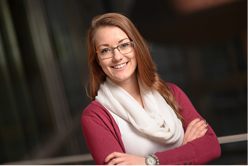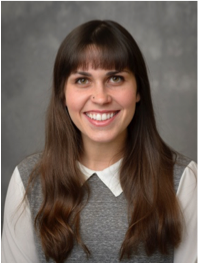EEE Awards and Recognitions
 Kaitlin Harris, a junior pursuing a dual degree in Anthropology and Environmental and Ecological Engineering at Purdue University, was selected to be the undergraduate representative on the Engineering Advisory Council for the College of Engineering. Kaitlin is a Purdue University Resident Assistant in Earhart Hall where she helps build a community of young women engineers in the Women in Engineering Learning Community. She was honored this year with the Learning Community Advocate Award for her outstanding service. She is also an Intern at Discovery Park's Center for the Environment. Kaitlin's career goals lie in sustainable communities and resilient culture. She aims to be involved in solving global issues by working to understand local perspectives and create culturally relevant solutions. She is currently involved in a research team focusing on human waste recycling and recovery.
Kaitlin Harris, a junior pursuing a dual degree in Anthropology and Environmental and Ecological Engineering at Purdue University, was selected to be the undergraduate representative on the Engineering Advisory Council for the College of Engineering. Kaitlin is a Purdue University Resident Assistant in Earhart Hall where she helps build a community of young women engineers in the Women in Engineering Learning Community. She was honored this year with the Learning Community Advocate Award for her outstanding service. She is also an Intern at Discovery Park's Center for the Environment. Kaitlin's career goals lie in sustainable communities and resilient culture. She aims to be involved in solving global issues by working to understand local perspectives and create culturally relevant solutions. She is currently involved in a research team focusing on human waste recycling and recovery.

Kimberly Reppa,a junior in EEE, was recognized as one of the “5 students who…” Driven by her passion for humanity's right to clean water, air and food, Kim Reppa calls herself a "scientifically literate artist and humanitarian." And from founding and directing the Human and Environmental Rights Organization (HERO) she's already begun to make a lasting impact. In her spare time she loves to travel and volunteer. She was a program coordinator for the Houston Mayor's Office of Sustainability and enjoys volunteering at local food banks and animal shelters. When she's not saving the world, she likes to write, sing and play music with her brother, Kyle.
Steven Cardenas (May 2017) and Sydney Weiss (May 2017) received $10,000 from H2O Hydrologists Helping Others to travel to Western Kenya to build and install slow sand filters. The grant is administered by the Department of Earth, Atmospheric, & Planetary Sciences. The students will be working with Professors Howarter (EEE/MSE) and Jafvert (EEE/CE) on this project. Slow sand filters remove turbidity (particles) and dissolved organic material from the water, allowing it to be disinfected by less expensive methods other than boiling. Steven and Sydney are members of a Global Design Team (through Purdue’s Global Engineering Program - https://engineering.purdue.edu/GEP) that has installed slow sand filters at various locations around the world (Colombia, Tanzania, Kenya, and China). What makes this project different is that the previously installed filters were designed for use in homes or small schools, whereas this project will be designing filters for a larger school. It will be installed at a rural school near Eldoret, Kenya. Not only will the students build filters when they arrive in Kenya, but they will also teach a local NGO how to build them.

Lauren Kennedy, BS EEE 2015, received a NSF Graduate Research Fellowship (GRF) that will provide three years of stipend and tuition support. This fall, Lauren plans to attend graduate school at the University of California at Berkeley. Through her PhD, Lauren hopes to improve water treatment methods in developing countries. The goals of the NSF GRF program are to select, recognize, and financially support individuals early in their careers with the demonstrated potential to be high achieving scientists and engineers, and to broaden participation in science and engineering of underrepresented groups. While at Purdue Lauren has taken every opportunity to expand her education beyond the classroom including a study abroad program in Switzerland, working in research laboratories, and an REU experience at Harvard.

Gamini Mendis was a recipient of the 2015 Magoon Award. The Magoon Award recognizes outstanding teaching assistants and instructors in the College of Engineering. He was nominated by Prof. Howarter on the basis of his distinguished service as a TA in EEE 43000: Industrial Ecology and Life Cycle Assessment. Comments from student evaluations also provided insight into his teaching contributions. Gamini was able to lower barriers for students in understanding difficult content and he regularly facilitated better communication between the students and instructor. Additionally, he was able to contribute to class discussions and lecture content on multiple occasions regarding topics pertinent to his thesis research (LCA of emerging nanomaterials, critical materials, etc.).
